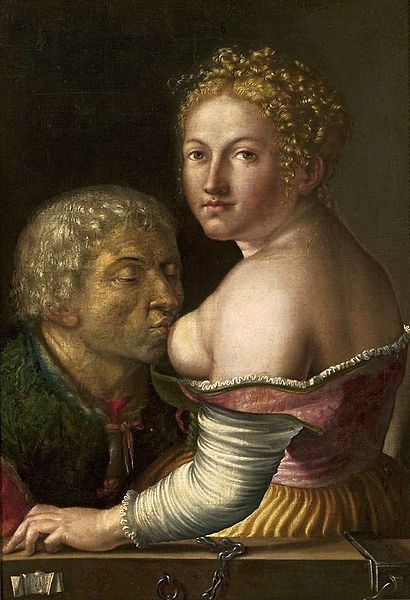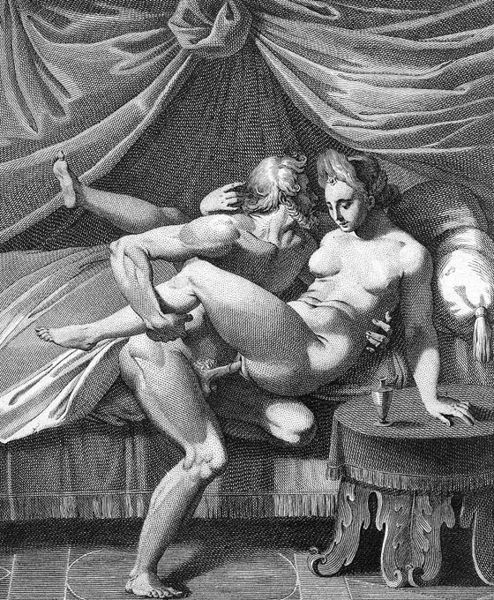
Gabriel von Max (via Wikimedia Commons)
* * *
Desire
Desire to us
Was like a double death,
Swift dying
Of our mingled breath,
Evaporation
Of an unknown strange perfume
Between us quickly
In a naked
Room.
— Langston Hughes
* * *
Come Slowly – Eden!
Come slowly – Eden!
Lips unused to Thee –
Bashful – sip thy Jessamines –
As the fainting Bee –
Reaching late his flower,
Round her chamber hums –
Counts his nectars –
Enters – and is lost in Balms.
— Emily Dickinson
* * *
Georg Pencz (via Wikimedia Commons)
* * *
Fresh Cheese and Cream
WOULD ye have fresh cheese and cream?
Julia’s breast can give you them.
And, if more, each nipple cries
To your cream here’s strawberries.
— Robert Herrick
* * *
Agostino Carracci (via Wikimedia Commons)
* * *
may i feel said he
may i feel said he
(i’ll squeal said she
just once said he)
it’s fun said she
(may i touch said he
how much said she
a lot said he)
why not said she
(let’s go said he
not too far said she
what’s too far said he
where you are said she)
may i stay said he
(which way said she
like this said he
if you kiss said she
may i move said he
is it love said she)
if you’re willing said he
(but you’re killing said she
but it’s life said he
but your wife said she
now said he)
ow said she
(tiptop said he
don’t stop said she
oh no said he)
go slow said she
(cccome?said he
ummm said she)
you’re divine!said he
(you are Mine said she)
— e. e. cummings
* * *
Terminus
Wonderful were the long secret nights you gave me, my Lover,
Palm to palm breast to breast in the gloom. The faint red lamp,
Flushing with magical shadows the common-place room of the inn
With its dull impersonal furniture, kindled a mystic flame
In the heart of the swinging mirror, the glass that has seen
Faces innumerous & vague of the endless travelling automata,
Whirled down the ways of the world like dust-eddies swept through a street,
Faces indifferent or weary, frowns of impatience or pain,
Smiles (if such there were ever) like your smile ad mine when they met
Here, in this self-same glass, while you helped me to loosen my dress,
And the shadow-mouths melted to one, like sea-birds that meet in a wave–
Such smiles, yes, such smiles the mirror perhaps has reflected;
And the low wide bed, as rutted and worn as a high-road,
The bed with its soot-sodden chintz, the grime of its brasses,
That has borne the weight of fagged bodies, dust-stained, averted in sleep,
The hurried, the restless, the aimless–perchance it has also thrilled
With the pressure of bodies ecstatic, bodies like ours,
Seeking each other’s souls in the depths of unfathomed caresses,
And through the long windings of passion emerging again to the stars . . .
Yes, all this through the room, the passive & featureless room,
Must have flowed with the rise & fall of the human unceasing current;
And lying there hushed in your arms, as the waves of rapture receded,
And far down the margin of being we heard the low beat of the soul,
I was glad as I thought of those others, the nameless, the many,
Who perhaps thus had lain and loved for an hour on the brink of the world,
Secret and fast in the heart of the whirlwind of travel,
The shaking and shrieking of trains, the night-long shudder of traffic,
Thus, like us they have lain & felt, breast to breast in the dark,
The fiery rain of possession descend on their limbs while outside
The black rain of midnight pelted the roof of the station;
And thus some woman like me, waking alone before dawn,
While her lover slept, as I woke & heard the calm stir of your breathing,
Some woman has heard as I heard the farewell shriek of the trains
Crying good-bye to the city & staggering out into darkness,
And shaken at heart has thought: “So must we forth in the darkness,
Sped down the fixed rail of habit by the hand of implacable fate–
So shall we issue to life, & the rain, & the dull dark dawning;
You to the wide flare of cities, with windy garlands and shouting,
Carrying to populous places the freight of holiday throngs;
I, by waste lands, & stretches of low-skied marsh
To a harbourless wind-bitten shore, where a dull town moulders & shrinks,
And its roofs fall in, & the sluggish feet of the hours
Are printed in grass in its streets; & between the featureless houses
Languid the town-folk glide to stare at the entering train,
The train from which no one descends; till one pale evening of winter,
When it halts on the edge of the town, see, the houses have turned into grave-stones,
The streets are the grassy paths between the low roofs of the dead;
And as the train glides in ghosts stand by the doors of the carriages;
And scarcely the difference is felt–yea, such is the life I return to . . .”
Thus may another have thought; thus, as I turned may have turned
To the sleeping lips at her side, to drink, as I drank there, oblivion . . . .
— Edith Wharton


